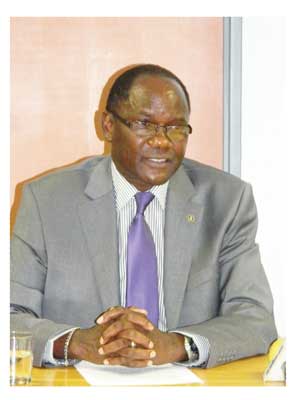
Let the children go to school – Namwandi

Dr David Namwandi, Deputy Minister of Education
“The practice of children not attending school is unconstitutional. Thus, I call upon all parents and guardians not to have in their houses any child who does not attend school,” he said.
According to Namwandi, if members of the communities work together and ensure that no child is engaged in activities that keep them from attending school, this will result in the successful implementation of Universal Primary Education throughout the country.
The implementation of the Universal Primary Education was announced earlier last month by the Minister of Education, Abraham Iyambo and will be fully implemented from Pre-Primary to Grade 7 at the start of this academic year.
Addressing a press conference in December, Iyambo said that the state has taken full responsibility for expanding and availing resources through regional budget programmes for pre-primary and primary education as cabinet has already availed N$50 million for the 2013/2014 financial year for the initial implementation of Universal Primary Education which should cater for 458,988 learners from Grade 0 to Grade 7.
“The details on how this will be distributed and accounted for already have been worked out and will be distributed to all regions and schools soonest,” he said.
He further said that the N$50 million includes an estimated 3.5% increase expected as a result of this announcement. This cost over the next six years will include grants to schools to replace school Development Fund Fees, text books and stationery, additional learners, additional teachers, classroom and furniture and miscellaneous costs.
Iyambo also said that schools should reimburse those parents or guardians who may have paid the School Development Fund as part of their registration requirements for 2013.
“Education is made accessible to all and communities whose children could not access school owing to School Development Fund contributions are directed to enrol their children in any public school within the Republic of Namibia without fear of being requested or compelled to pay [the] School Development Fund as a condition. Principals, school boards and teachers in all public primary schools are thus directed to adhere strictly to this directive,” he said.
Reiterating what the minister said last year, Namwandi said while the state fulfills this obligation it should be borne in mind that parents play the most important role in the lives and education of their children.
“Schools remain part of the community in which parental involvement is paramount. Children in school will need love, support and care from parents and the assurance that each parent sends his/her child to school,” he said. No children need to be turned away from school after this announcement.”.
With the implementation of Universal Primary Education in line with Article 20 of the Namibian Constitution, Namibia will thus meet its commitment to achieving Universal Primary Education including UNESCO Education for All, Goal 2 and the UN Millennium Development Goal, Target 2.A by 2015.
However parents with children at public schools who would like to make individual voluntary contributions to the schools are free to do so.











































